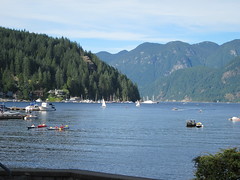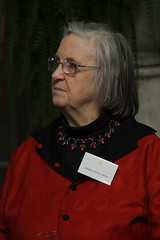 Recently, I was asked on Twitter about what I meant by a research trajectory (I discussed my research interests and the plans I had for my future investigations in a previous blog post). For context, I have been thinking about maturing as a scholar and research trajectories for the past few months. For example, I recently had to assemble my submission to the National Researchers System (Sistema Nacional de Investigadores) in Mexico. My brother and I recently reviewed his research interests’ statement (he’s also a professor) and I explained to him how I wrote mine. Last November, I also had to produce a research plan for the next 3 years. And my research assistants just asked me how I knew where I was going (as a scholar).
Recently, I was asked on Twitter about what I meant by a research trajectory (I discussed my research interests and the plans I had for my future investigations in a previous blog post). For context, I have been thinking about maturing as a scholar and research trajectories for the past few months. For example, I recently had to assemble my submission to the National Researchers System (Sistema Nacional de Investigadores) in Mexico. My brother and I recently reviewed his research interests’ statement (he’s also a professor) and I explained to him how I wrote mine. Last November, I also had to produce a research plan for the next 3 years. And my research assistants just asked me how I knew where I was going (as a scholar).
I have noticed how I have matured as a scholar, not only in the PhD-to-professor process kind-of-maturing (where you need to demonstrate that you can think differently from your PhD advisor, when you are ready to undertake independent thinking and analyzing), but also in how I examine problems and what kind of scholarship I apply. I have also noticed how other senior scholars have shifted their thinking.
Let me explain with an example. Ten years ago, when I first met Elinor Ostrom and Vincent Ostrom, they had already been thinking for a very long time about issues of collective action for resource governance, multi-level governance and self-organization in local communities for water management. I first learned about institutions from the Ostroms, and what they taught me did shape how I think now about resource governance. I know that the Ostroms’ thinking around institutions and polycentric governance itself evolved through the years. And it took me a good 2-3 years after my PhD to really think hard and find out what exactly is the core of my theoretical and analytical processes. It is NOT that I am obsessed with the Ostroms and their scholarship (though admittedly, I admired them as academics and loved them as people). What happens is that at the very core of my work for the past 10, 15 years, I have been studying cooperation and conflict. In completely different areas, but if you examine with a critical eye what I investigate, at the very core, I am interested in cooperation amongst agents. I always have, and I probably always will.
As Jo VanEvery put it in a comment on my post,
That is a great description. The thing about cooperation between agents connects what otherwise might look like a very diverse research agenda into something much more coherent. You have particular empirical interests right now (water, especially) but you have successfully identified the core that would remain even if that particular focus changed.
While the kind of research I focus on has evolved, and I have shifted from a main interest in strategic alliances (during my MBA) to clusterization and industrial agglomeration (during my PhD) to networked governance of natural resources (as a professor), I have always maintained an interest in cooperation. And my scholarly findings have shown under what circumstances cooperation exists. That kind of maturing, knowing exactly what kind of questions I want to answer in the future, I think is crucial for any researcher.
I set out to design my research trajectory not only because well, I do want tenure (and this suggestion by Karen Kelsky on how to design a research trajectory applies mostly to PhD students and on-the-tenure-track professors), but more importantly because I want to ensure that where I am in 3 to 6 years (analytically speaking) is further from where I am right now. I have long known that I eschew popular research in favor of cutting-edge, non-mainstream scholarship, and I intend to stay on that course.
 Academic fields also evolve, and other scholars mature as well, and their thinking becomes more refined, as my trusted former PhD advisor always said. I remember when I was in 3rd year of my PhD and he said to me that I would some day re-read my previous work and think how far I have come and how evolved my thinking is, and he was entirely right. One of my fields (water policy) also has evolved. Eight years ago, few people in Mexico wrote about water governance, and this past year, the popularity of the term exploded. I was challenging the validity of governing by research councils since 2007, and now even respected scholars who previously defended the policy now have questioned whether it is a valid one. I think this demonstrates that the field itself matures, and that scholars reshape their own thinking as they learn from others.
Academic fields also evolve, and other scholars mature as well, and their thinking becomes more refined, as my trusted former PhD advisor always said. I remember when I was in 3rd year of my PhD and he said to me that I would some day re-read my previous work and think how far I have come and how evolved my thinking is, and he was entirely right. One of my fields (water policy) also has evolved. Eight years ago, few people in Mexico wrote about water governance, and this past year, the popularity of the term exploded. I was challenging the validity of governing by research councils since 2007, and now even respected scholars who previously defended the policy now have questioned whether it is a valid one. I think this demonstrates that the field itself matures, and that scholars reshape their own thinking as they learn from others.
Political science is a great example of an evolving field. Lately, I have seen more political scientists use social network analysis in their research (a tool that has been used in sociology for decades). Economists and geographers now can straddle two fields (geographical economics and economic geography). That is also why I encourage my students (and fellow researchers) to read widely and across academic fields.
That is what I love about being an academic: that I get to think hard about tough issues that require policy action, and that I get to do so and get paid for it.


This is a fantastic explanation. This concept of research trajectory is so important and yet it is often unspoken. I first heard of it when I was applying for a promotion to senior lecturer (about 6 years into my academic career). It was one of those things I wished someone had told me earlier. And that is one of the reasons I now do what I do.
It is great that you have had me and Karen to let you know about this stuff and that you are passing on that knowledge and how you’ve applied it to your own work to others.